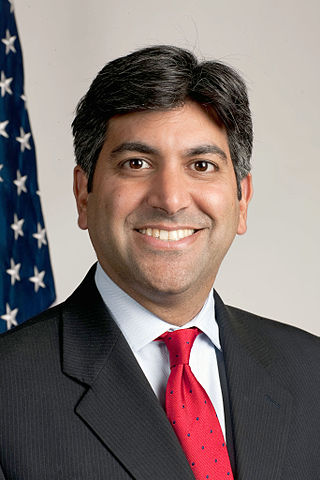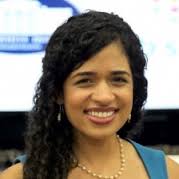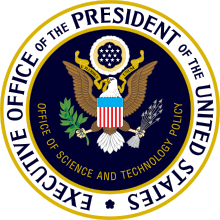
The Office of Management and Budget (OMB) is the largest office within the Executive Office of the President of the United States (EOP). OMB's most prominent function is to produce the president's budget, but it also examines agency programs, policies, and procedures to see whether they comply with the president's policies and coordinates inter-agency policy initiatives.

The Council on Environmental Quality (CEQ) is a division of the Executive Office of the President that coordinates federal environmental efforts in the United States and works closely with agencies and other White House offices on the development of environmental and energy policies and initiatives.
Policy analysis or public policy analysis is a technique used in the public administration sub-field of political science to enable civil servants, nonprofit organizations, and others to examine and evaluate the available options to implement the goals of laws and elected officials. People who regularly use policy analysis skills and techniques on the job, particularly those who use it as a major part of their job duties are generally known by the title policy analyst. The process is also used in the administration of large organizations with complex policies. It has been defined as the process of "determining which of various policies will achieve a given set of goals in light of the relations between the policies and the goals."
The excepted service is the part of the United States federal civil service that is not part of either the competitive service or the Senior Executive Service. It provides streamlined hiring processes to be used under certain circumstances.
The Philippines' Presidential Management Staff is an agency attached to Malacañang that is tasked to manage the development and formulation of the projects and policies of the Office of the President. Though the PMS is headed by a Secretary, the Secretaries of the Cabinet, Chief of Staff, and Appointments, support the agency. The PMS, the Office of the Appointments Secretary and the newly created Events Management Cluster are under the supervision of the Office of the Special Assistant to the President.
The Interagency Working Group on Youth Programs is a group within the executive branch of the U.S. government, and is responsible for promoting healthy outcomes for all youth, including disconnected youth and youth who are at-risk. The Working Group also engages with national, state, local and tribal agencies and organizations, schools, and faith-based and community organizations that serve youth.
The White House Council on Women and Girls was an advisory council within the Office of Intergovernmental Affairs of the Executive Office of the President of the United States. It was established by Executive Order 13506 on March 11, 2009, with a broad mandate to advise the president on issues relating to the welfare of women and girls in order to ensure gender equality. It also ensured that other White House agencies acted in a manner to allow all things to be possible for all people. The Council was chaired by Valerie Jarrett and included the heads of every federal agency and major White House office.

Aneesh Paul Chopra is an American executive who served as the first Chief Technology Officer of the United States. He was appointed in 2009 by President Barack Obama and was at the White House through 2012. Chopra previously served as Virginia's Secretary of Technology under Governor Tim Kaine. Chopra was a candidate in 2013 for the Democratic nomination for Lieutenant Governor of Virginia. He is the author of Innovative State: How New Technologies Can Transform Government (2014) and co-founder and president of CareJourney. In 2015 he joined Albright Stonebridge Group as a senior advisor.
The United States Chief Technology Officer is an official in the Office of Science and Technology Policy. The U.S. CTO helps the President and their team harness the power of technology and data to benefit all Americans. The CTO works closely with others both across and outside government on a broad range of work including bringing technology expertise to bear on federal policy and programs, and promoting values-driven technological innovation. The CTO and their team have historically focused on leveraging technology and technical expertise to help create jobs, strengthen privacy protections, harness the benefits and mitigate the risks of artificial intelligence, create paths to improve government services with lower costs, higher quality and increased transparency and accessibility, help upgrade agencies to use open data and expand their data science capabilities, improve quality and reduce the costs of health care and criminal justice, increase access to broadband, bring technical talent into government for policy and modern operations input, improve community innovation engagement by agencies working on local challenges, and help keep the nation secure.
The Office of Social Innovation and Civic Participation was an office new to the Obama Administration, created within the White House, to catalyze new and innovative ways of encouraging government to do business differently. Its first director was the economist Sonal Shah. The final director was David Wilkinson.

The Arctic policy of the United States is the foreign policy of the United States in regard to the Arctic region. In addition, the United States' domestic policy toward Alaska is part of its Arctic policy.
Executive Order 13514 was an Executive Order, entitled Federal Leadership in Environmental, Energy, and Economic Performance, which U.S. President Barack Obama issued on October 5, 2009. EO 13514 was replaced by Executive Order 13693, titled Planning for Federal Sustainability in the Next Decade, issued by Obama on March 19, 2015. The Office of the Federal Environmental Executive, whose name was changed to the Office of Federal Sustainability by Executive Order 13693, is housed at the Council on Environmental Quality within the Executive Office of the President of the United States. Its role is to oversee policy, guidance, and implementation of the sustainability Executive Order.

The Presidential Innovation Fellows program is a competitive fellowship program that pairs top innovators from the private sector, non-profits, and academia with top innovators in government to collaborate on solutions that aim to deliver significant results in months, not years. It was established in 2012 and has operated continuously since then. The program focuses on generating measurable results, using innovation techniques from private industry such as Lean Startup, Design Thinking, and Agile Development.
The Behavioural Insights Team (BIT), also known unofficially as the "Nudge Unit", is a UK-based global social purpose organisation that generates and applies behavioural insights to inform policy and improve public services, following nudge theory. Using social engineering, as well as techniques in psychology, behavioral economics, and marketing, the purpose of the organisation is to influence public thinking and decision making in order to improve compliance with government policy and thereby decrease social and government costs related to inaction and poor compliance with policy and regulation. The Behavioural Insights Team has been headed by British psychologist David Halpern since its formation.
The Office of the Assistant Secretary for Planning and Evaluation (ASPE) is the principal advisory group to the United States Secretary of the Department of Health and Human Services (HHS) on policy development and provides coordination and support for HHS's strategic and policy planning, planning and development of legislation, program evaluation, data gathering, policy-related research, and regulatory program.

The White House Initiative on Asian Americans, Native Hawaiians, and Pacific Islanders (WHIAANHPI) is a United States governmental office that coordinates an ambitious whole-of-government approach to advance equity, justice, and opportunity for Asian Americans, Native Hawaiians, and Pacific Islanders. The Initiative collaborates with the Deputy Assistant to the President and AA and NHPI Senior Liaison, White House Office of Public Engagement and designated federal departments and agencies to advance equity, justice, and opportunity for AA and NHPIs in the areas of economic development, education, health and human services, housing, environment, arts, agriculture, labor and employment, transportation, justice, veterans affairs, and community development.

Maya Shankar is a cognitive scientist and the host and executive producer of the podcast, A Slight Change of Plans,
The Rhode Island Innovative Policy Lab (RIIPL) is an interdisciplinary collaboration between the Office of the Governor of Rhode Island and researchers at Brown University. The lab's mission is to help state agencies design evidence-based policies that improve the quality of life for Rhode Islanders.
Behavioral Science & Policy is an international, dual peer-reviewed academic journal. The journal is a joint publication between the Behavioral Science and Policy Association and the Brookings Institution Press. The journal was first published in 2015; the founding co-editors are Craig R. Fox and Sim B Sitkin.







